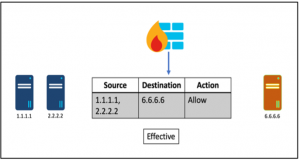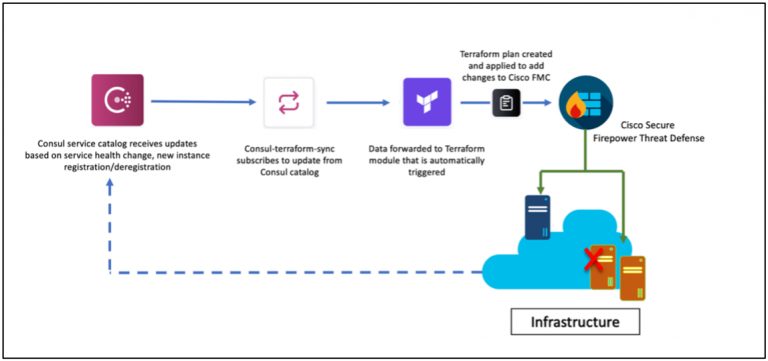
Relevant and Extended Detection with SecureX, Part Four: Secure Cloud Analytics Detections
February 18, 2022
Microsoft Security delivers new multicloud capabilities
February 24, 2022Network Security Automation using Cisco Secure Firewall and HashiCorp’s Consul

Today, more organizations are embracing microservices and dynamic infrastructure deployments in cloud environments. In these environments, instances and services can be created and decommissioned as needed, which means keeping track of updates to such components in a fast-changing environment is a challenge for SecOps teams. This new reality requires solutions that are as dynamic as the environments they need to automate.
Dealing with Changing IP Addresses
Here’s an example: a security policy configured on the Cisco Secure Firewall allows traffic from one service to another based on their IP addresses. It is effective as long as the IP address does not change. If the destination node goes down or becomes inaccessible, another node will replace it, making the policy ineffective. The policy does not dynamically change on the Firewall — it needs an administrator to log into the device and manually update it unless the Cisco Secure Firewall Management Center (FMC) receives dynamic updates to modify the policy rules based on the attributes of the node.
 .
. 
Network Automation with Consul-Terraform-Sync
HashiCorp Consul is a service mesh solution providing service discovery, configuration, and segmentation functionality across several environments. Its service discovery feature allows Consul agents to register services to a central registry called the Consul service catalog.
The Consul-Terraform-Sync service uses the Consul catalog as a data source that contains networking information about services and watches Consul state changes at the application layer (based on service health changes, new instances deployed, etc.) and forwards the data to a CTS-compatible Terraform module that is automatically triggered.
Terraform is used as the underlying automation tool and it leverages the Terraform provider ecosystem to drive relevant changes to the network infrastructure. Using the dynamic objects module, for example, Consul-Terraform-Sync is able to dynamically update values of objects in Cisco Secure Firewall Management Center (FMC) that are applied as access rules to the firewall.
When the Consul-Terraform-Sync solution is used in conjunction with the dynamic object, the FMC is updated with the IP address mappings received by the dynamic objects Terraform module. This in turn updates the access rules on the FMC containing that object, which ensures that the right access is always provided to the right services. This diagram illustrates the process:

To see how to set up Consul-Terraform-Sync, read HashiCorp’s Network Infrastructure Automation with Consul-Terraform-Sync tutorial on HashiCorp Learn.
Cisco and Consul-Terraform-Sync: Better Together
The partnership between Cisco and HashiCorp provides an agile solution for tracking dynamic changes in a cloud environment. Read the dynamic objects Terraform module documentation for more detailed usage and workflow information on integrating Cisco Secure Firewall and Consul-Terraform-Sync.
Related resources:
YouTube Video: Network Security Automation using Cisco Secure Firewall and HashiCorp’s Consul
Cisco Secure FMC Terraform Provider
We’d love to hear what you think. Ask a Question, Comment Below, and Stay Connected with Cisco Secure on social!
Cisco Secure Social Channels
Instagram
Facebook
Twitter
LinkedIn

